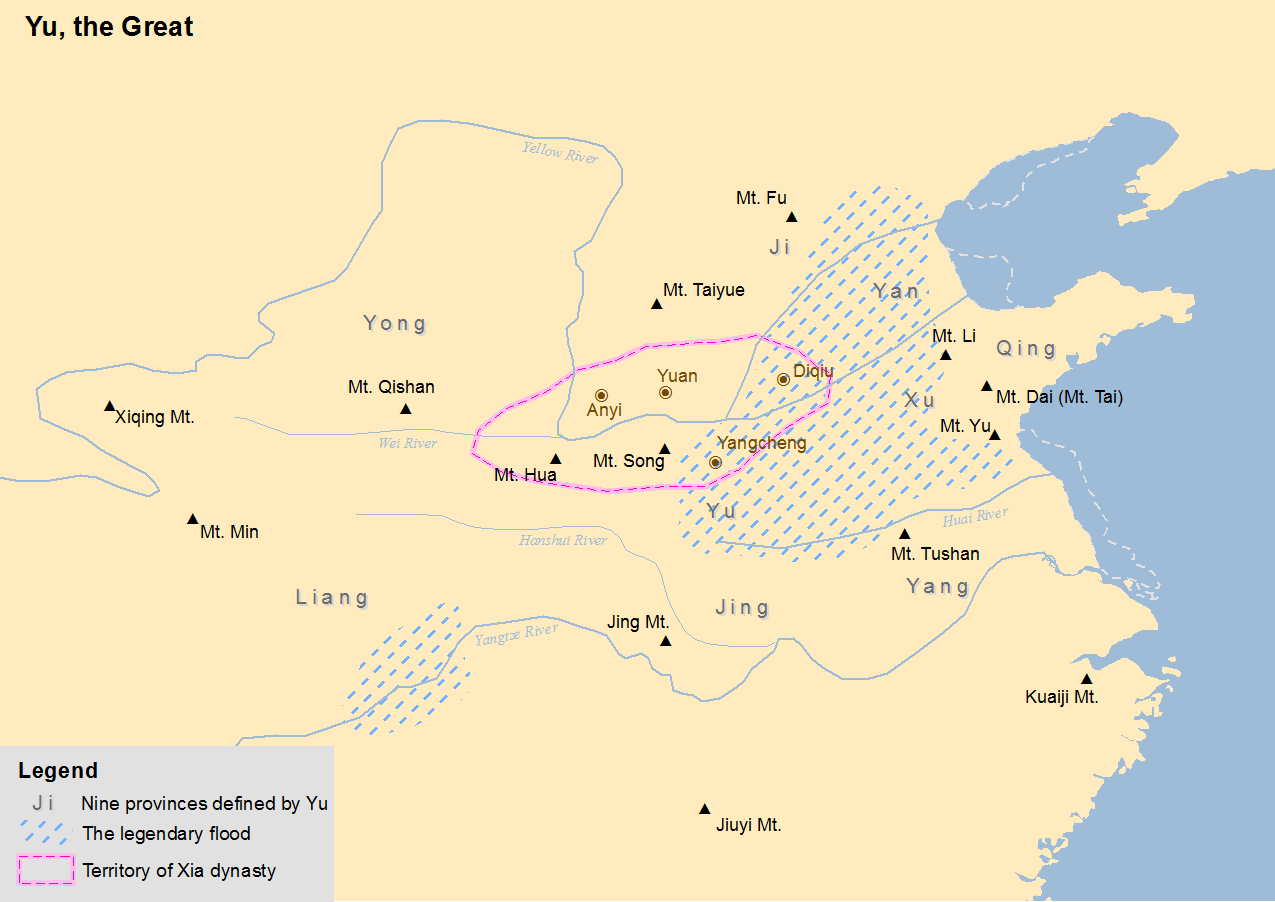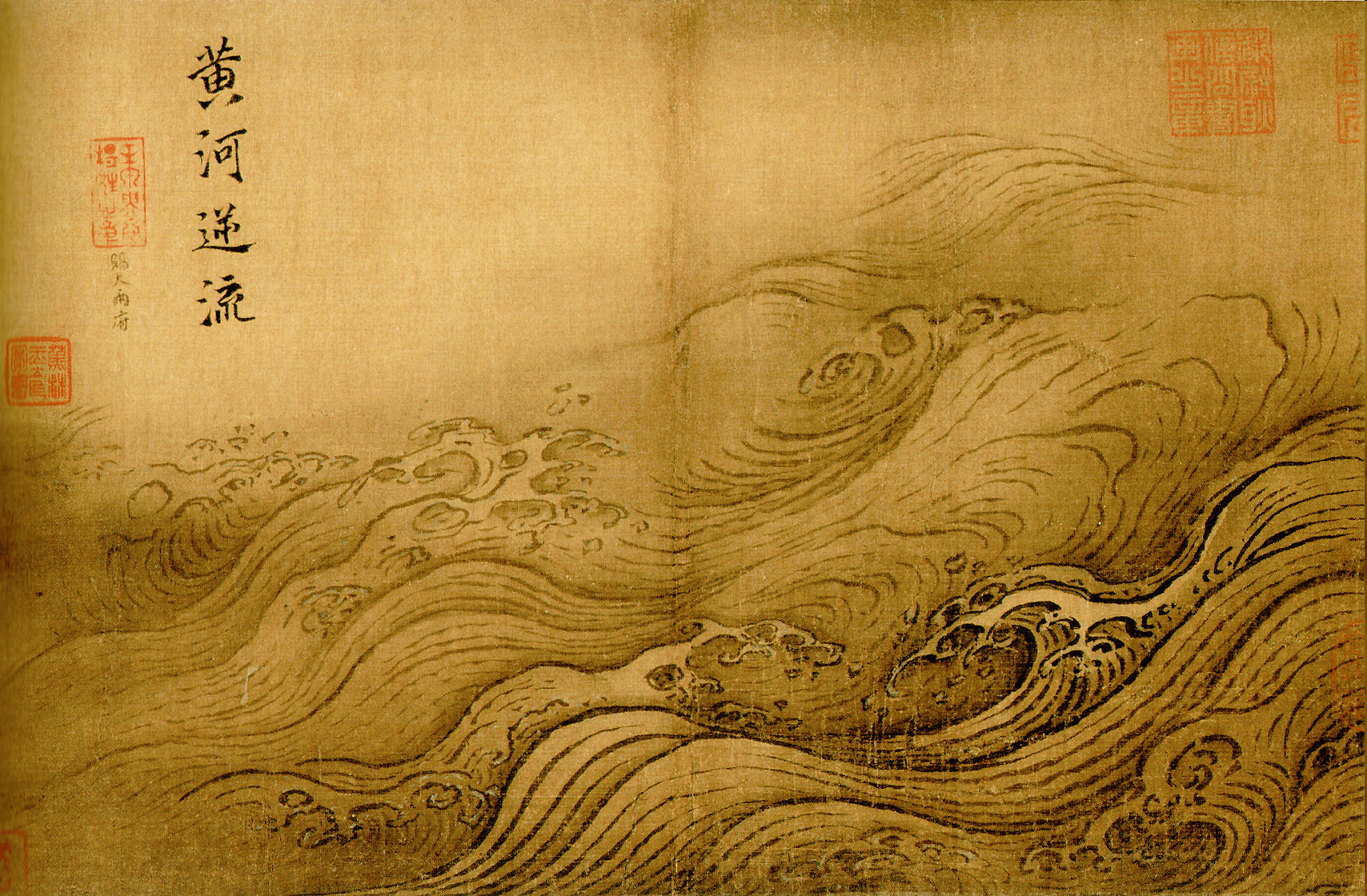|
Predynastic Shang
Predynastic Shang or Proto-Shang (; ) refers to the state of Shang that is believed to have existed during the Xia dynasty in ancient China, before its conquest of the Xia in approximately 1600 BC that led to the establishment of the Shang dynasty. The Predynastic Shang started from Xie, a son of Emperor Ku and the first known Shang ancestor. Xie is said to have helped Yu the Great, the founder of the Xia dynasty, to control the Great Flood and for his service to have been granted a place called Shang as a fief. The period would last until Tang defeated Jie of Xia in the Battle of Mingtiao, eventually overthrowing the Xia dynasty. During the period of the 14 predynastic Shang rulers before Tang, the capital changed eight times. The area where early forms of Predynastic Shang culture are found include the eastern foothills of the Taihang Mountains in Hebei and the area around the city of Weihui in Henan, north of the Yellow River. These sites are close to places traditionally cons ... [...More Info...] [...Related Items...] OR: [Wikipedia] [Google] [Baidu] |
Xia Dynasty
The Xia dynasty () is the first dynasty in traditional Chinese historiography. According to tradition, the Xia dynasty was established by the legendary Yu the Great, after Shun, the last of the Five Emperors, gave the throne to him. In traditional historiography, the Xia was later succeeded by the Shang dynasty. There are no contemporaneous records of the Xia, who are not mentioned in the oldest Chinese texts, since the earliest oracle bone inscriptions date from the late Shang period (13th century BC). The earliest mentions occur in the oldest chapters of the ''Book of Documents'', which report speeches from the early Western Zhou period and are accepted by most scholars as dating from that time. The speeches justify the Zhou conquest of the Shang as the passing of the Mandate of Heaven and liken it to the succession of the Xia by the Shang. That political philosophy was promoted by the Confucian school in the Eastern Zhou period. The succession of dynasties was incorporat ... [...More Info...] [...Related Items...] OR: [Wikipedia] [Google] [Baidu] |
Yellow River
The Yellow River or Huang He (Chinese: , Mandarin: ''Huáng hé'' ) is the second-longest river in China, after the Yangtze River, and the sixth-longest river system in the world at the estimated length of . Originating in the Bayan Har Mountains in Qinghai province of Western China, it flows through nine provinces, and it empties into the Bohai Sea near the city of Dongying in Shandong province. The Yellow River basin has an east–west extent of about and a north–south extent of about . Its total drainage area is about . The Yellow River's basin was the birthplace of ancient Chinese, and, by extension, Far Eastern civilization, and it was the most prosperous region in early Chinese history. There are frequent devastating floods and course changes produced by the continual elevation of the river bed, sometimes above the level of its surrounding farm fields. Etymology Early Chinese literature including the '' Yu Gong'' or ''Tribute of Yu'' dating to the ... [...More Info...] [...Related Items...] OR: [Wikipedia] [Google] [Baidu] |
Chang Ruo
Chang Ruo () was the ancestor of the Shang dynasty. His family name is Zi (). He was the fourth leader of the Shang tribe. History His great-grandfather was Xie. His grandfather was Zhao Ming. His father was Xiang Tu. His son was Cao Yu, the founding monarch of the Tang ancestors. In order to domesticate horses, his father, Xiang Tu, was in the position of Xiang of Xia, and the horse was made. After the death of Xiang Tu, Chang Ruo succeeded him. When he died, his son, Cao Yu, succeeded him,《史記》:相土卒,子昌若立。昌若卒,子曹圉立。 but because the name of Chang Ruo appears later, it may be a fictitious one. Family *Great-great-grandfather: Emperor Ku () **Great-grandfather: Xie () ***Grandfather: Zhao Ming () ****Father: Xiang Tu () *****Self: Chang Ruo () ******Son: Cao Yu ({{Lang, zh, 曹圉) Bibliography "Records of the Grand Historian ''Records of the Grand Historian'', also known by its Chinese name ''Shiji'', is a monumental his ... [...More Info...] [...Related Items...] OR: [Wikipedia] [Google] [Baidu] |
Xiang Tu
Xiang Tu (; ? – ?) was an ancient Chinese noble, an ancestor of the Shang dynasty. His family name is Zi (子), and his other name is Cheng Du (乘杜). His hometown is in Shangqiu (商丘), Henan (河南), and he was the third leader of the Shang nation. History He was the son of Zhao Ming of Shang and thus the grandson of Xie of Shang, being also an ancestor of the King Tang of Shang. In the beginning, people still did not know the horse drawn cart is used for travel. It was said that he raised horses. The horse is tamed and trained, so the horse can pull the car and become one of the important means of transportation. It can be seen that in the time of Xiang Tu, the Shang people have migrated from the nomadic life to the life of animal husbandry and agricultural cultivation. He developed forces in the east by force, on the coast of the Yellow Sea (黃海) and in the nearby islands.《索隱》相土佐夏,功著於商,詩頌曰“相土烈烈,海外有截”是也。� ... [...More Info...] [...Related Items...] OR: [Wikipedia] [Google] [Baidu] |

